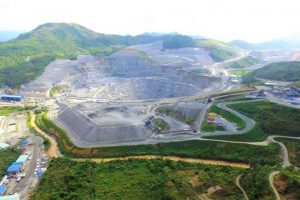THE PHILIPPINES must avoid over-regulating open-pit miners to the point of rendering their operations unviable, a government think tank said.
“The most daunting task lies in finding a balance” between protecting the environment and reaping the economic benefits of mining, Ludwig John H. Pascual, a consultant with the Philippine Institute for Development Studies, said at a webinar on Thursday.
“This involves effectively enforcing environmental regulations to protect our natural resources and the welfare of local communities while not excessively constraining mining to the point of making it unprofitable,” he added.
In 2017, former Environment Secretary Regina Paz L. Lopez signed Department Administrative Order (DAO) No. 2017-10, which banned open-pit mining and ordered the closure of 22 out of 41 mines found to have breached environmental rules.
The ban was lifted by her successor, Roy A. Cimatu, who issued DAO No. 2021-40 to revitalize the mining industry and contribute to economic growth that had been dampened by the pandemic.
Mr. Pascual said that despite mining’s low contribution to gross regional domestic product, the industry, along with quarrying continues to grow.
“We need to optimize benefits from open-pit mines, while addressing ecological integrity concerns. This requires strengthening transparency platforms including monitoring and evaluation standards and metrics,” he said.
Mr. Pascual said that the Philippines needs to establish sustainability indicators and monitoring and evaluation platforms.
This includes “ecological integrity indicators” for watershed management, forest cover, water resource, water bodies, biodiversity, audits, mineral wealth, among others.
Eramin Minerals, Inc. Vice-President for Operations Alexandrie D. Amadeo said that the long-term environmental impact of open-pit mining include permanent alterations to landscapes, habitat loss and potential contamination of soil and water sources if not corrected at the onset.
“We need to accept that mining, as noted by the study, is not a sustainable activity. The mine becomes depleted in the end, and it has other impacts, but income from mining could be sustainable under certain conditions,” according to Marian S. De Los Angeles, board member emeritus of the Resources, Environment, and Economic Center for Studies.
Danny P. Berches, head of the Mine Environment Audit Section at the Mines and Geosciences Bureau (MGB), said that a draft DAO is currently under review that will set guidelines for implementing Natural Capital Accounting within the Department of Environment and Natural Resources (DENR).
He said that the framework will guide data collection, valuation techniques, the integration of natural capital accounting with existing economic and environmental accounting systems, and reporting mechanisms.
Valuation serves as a springboard for conducting cost-benefit analyses, by providing a basis for estimating the value of the resource as against the cost of the resources invested as well as the damage done.
He added that the DENR and MGB are also reviewing proposed amendments to Republic Act No. 7942 or the Philippine Mining Act of 1995, along with its implementing rules and regulations. He said the review aims to address overlapping and outdated provisions. — Sheldeen Joy Talavera

